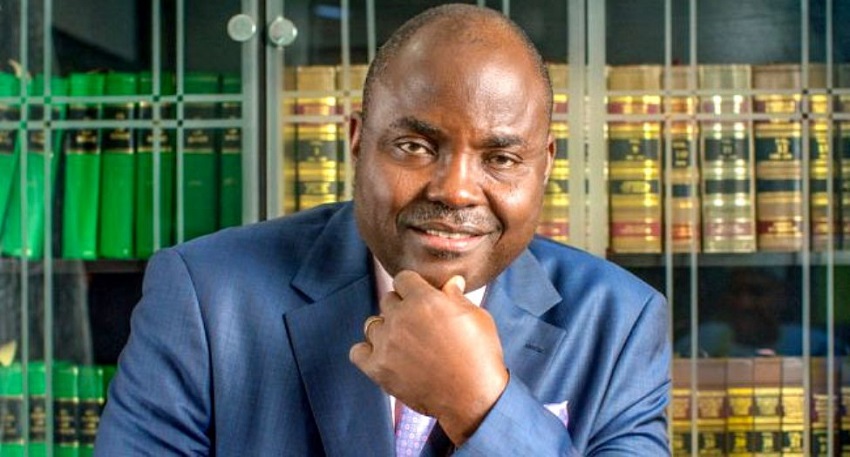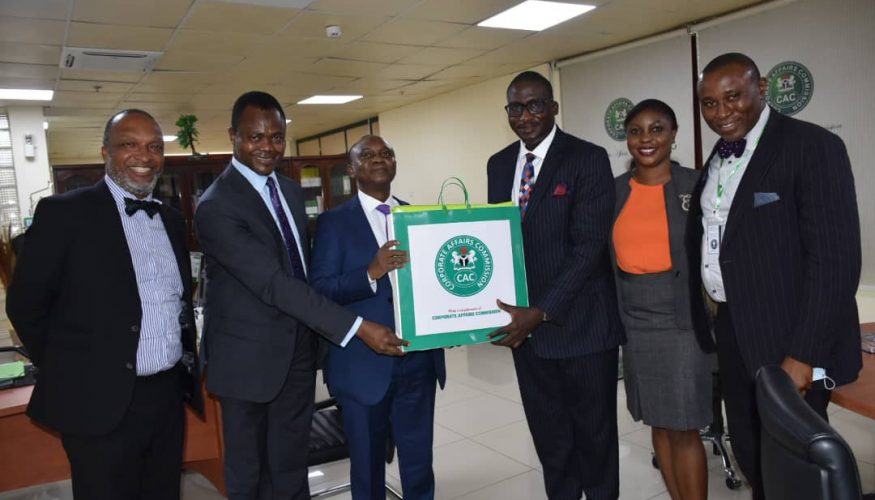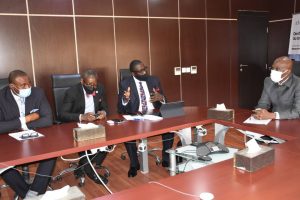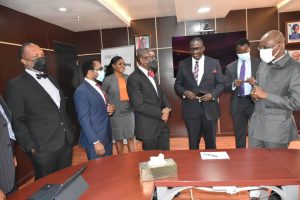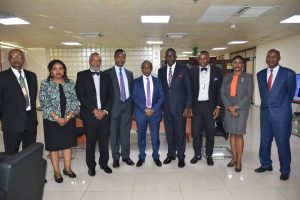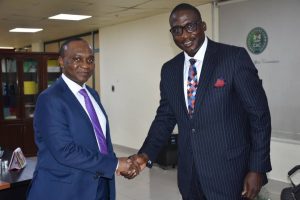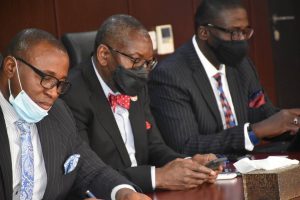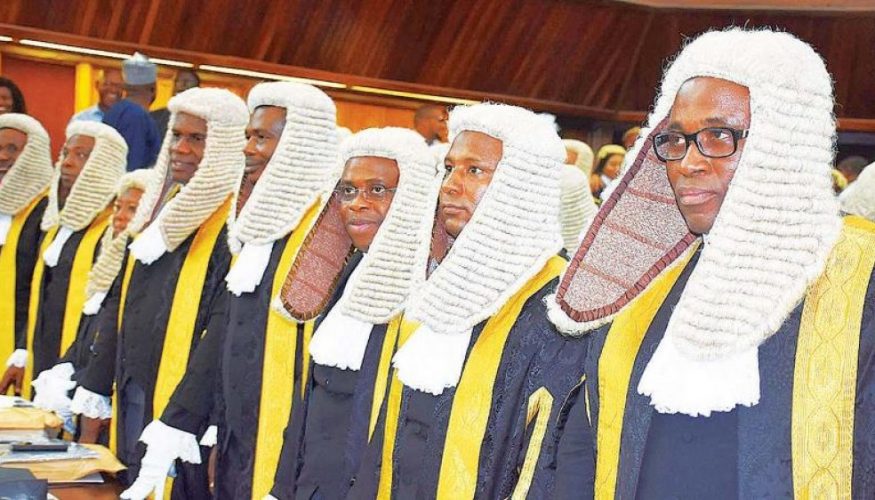‘SAN RANK HAS BEEN DEVALUED, UNDERMINED,’ SAYS OKUTEPA
Against the backdrop of the raging debate over the quality of lawyers being conferred with the coveted rank of Senior Advocate of Nigeria (SAN), senior lawyer, MR. JIBRIN OKUTEPA SAN insists, in a post he made on CITY LAWYER platform, that “the (SAN) Rank is being devalued and its dignity undermined.”
There have been many reactions to the issues raised by my learned friend of the Inner Bar Ebun-Olu Adegboruwa SAN and my support for his stand of a need to review the award of the Rank of SAN to our learned colleagues in the academics.
Many in the academics and some of legal practitioners see the arguments as needless and have held the views that myself and Ebun-Olu Adegboruwa SAN and others are generating needless controversies. Unfortunately, we are being misunderstood.
But is Adegboruwa SAN and myself wrong in the concerns we raised. I do not think so. Let us go to the place where we borrowed the concept of this Rank from. It is from UK. It is called QC there and now KC. Are academics and lawyers not in practice as Advocates awarded the Rank in Uk.
Yes. What name does UK call them. Let us see the 2022 UK Guidelines on this issue. In the Gazette, the Official Publication of UK in 2022 which you can Google and see, the following are decernable.
Those who are not Advocates in courts are awarded the Queen’s Counsel Honoris Causa. Let me quote the Gazette in extensio.
It reads: “Nominations open for the Queen’s Counsel Honoris Causa
The Ministry of Justice (MOJ) is inviting nominations for the Queen’s Counsel Honoris Causa award. The honorary award recognises those in the legal profession who have made a major contribution to the law of England and Wales outside the courtroom. Queen’s Counsel Honoris Causa Award”
“What is the Queen’s Counsel Honoris Causa? The Queen’s Counsel Honoris Causa (QC Honoris Causa) is an honorary award unique to the legal profession. Made by royal prerogative, the award recognises those in the profession who have made a major contribution to, and impact on, the law of England and Wales outside the courtroom. The award is not a working rank and is separate to substantive QC appointments administered by Queen’s Counsel Appointments.
Where someone is eligible to apply for substantive QC in their role, the Ministry of Justice (MOJ) would not normally consider them for an Honorary QC award.
What is the QC Honoris Causa for? The QC Honoris Causa is awarded to those in the legal profession who have had a significant, positive impact outside the courtroom either on the shape of the law of England and Wales, or on the profession. According to the MOJ, this criterion can be interpreted broadly, either as: a major contribution to the development of the law of England and Wales – for example, by dedicated research, influencing case law/legislation and promoting initiatives to how it is advanced – for example, by positively impacting the shape of the profession. Examples Influencing legislation Making an impact on the law by influencing legislation or case law – for example, through outcome of research, creating awareness or campaigning, pro bono work or other advocacy outside the courtroom.
Social mobility and Diversity
Making a considerable impact on the legal profession – for example, through initiatives that have an impact on social mobility or diversity and increase the competitiveness of the sector.
Innovation: Making an impact through a standout achievement or through innovation – for example, by breaking through into new territory, such as making an impact through work on Lawtech, innovation in legal education, or that promote UK legal services overseas.
Academic work: Making an impact through outstanding academic work that makes a positive contribution to the law and/or legal system. You can see examples of previous successful nominees by viewing their case studies.
Who is eligible for the QC Honoris Causa award? To be eligible for the award, the individual must be a qualified lawyer or legal academic and the nomination must be for achievement outside practice in the courts. In other words, an award would be made for non-advocacy work. The award is open to foreign qualified professionals. There is no residency requirement. Examples of those eligible may include (but are not limited to): solicitors without higher rights of audience. legal executives in-house lawyers, including Counsel
non-practising lawyers, legal academics
Holding a fee-paid judicial office in addition to normal practice would not exclude lawyers who meet the eligibility criteria above. However, it should be noted that someone who has been honoured in the main honours system within the last two years, or who has been nominated for such an honour this year, would not be eligible to receive an Honorary QC award.
How are awards made? Nominations are considered against the criterion by a panel of representatives from the legal profession, civil service, judiciary, and academia, which is chaired by MOJ.
The panel of representatives provide the Lord Chancellor with recommendations of appointable nominees. The Lord Chancellor, whose role is to ensure that the process has been carried out in a fair, open and transparent way, will then consider and decide the final recommendations.
The recommendations are then referred to the Queen for agreement, who grants the awards under the royal prerogative.
How to nominate someone for the QC Honoris Causa award. Anyone can make a nomination. You do not need to have a legal background or reside in the UK and you may nominate as many people as you like”.
Find out more about the Honorary Queen’s Counsel Nomination Form (GOV.UK). Publication date: 29 June 2022.
The arguments or suggestions by myself and my learned friend of the Inner Bar, Ebun-Olu Adegboruwa SAN and others are not intended to undermine, denigrate, rubbish, abuse or belittle those Nigerian academics who had been awarded the Rank of SAN.
But we as well meaning legal practitioners are interrogating the appropriateness of awarding the Rank of SAN to law teachers who strictly speaking are not Advocates in the Court rooms.
My concern and others is that the present mode of giving the award to academics in some cases, is in not line with the provisions of the Guidelines for giving the award.
The Guidelines only empowers Legal Practitioners’ Privileges Committee ((LPPC) to confer the rank on academics in exceptional cases on academics who have made “substantial contributions to the practice of Law, through teaching, research and publications that have become major source of reference by Legal Practitioners’, Judges, Law Teachers and Law Students”.
Not only are most of the academics on whom the rank is conferred largely unknown, their publications are neither not well known nor have become major source of reference by Legal Practitioners’, Judges, Law Teachers and Law Students.
In violation of the provisions of the Guidelines, academics are appointed based on Point system. The points are given based on the quantity of publications submitted by the Applicant rather than on the requirement that the publications must be major reference material by legal practitioners, judges law teachers and students. So all an academic needs to do to qualify is to bring a bagful of publications and score more points than other Apolicants. This is totally unacceptable.
This explains why many of the academics as well as their publications are largely unknown. Of equal importance is the fact that even though the academics do not go through rigorous process advocates go through to take silk, they utilize the rank in court. If the LPPC must continue to approve the award of the rank on academics then it must be done honoris causa as done in UK as shown above.
I concede that there are great academics who met the criteria for the award. For instance, when we speak of great academics like Professor Ben Nwabueze SAN, Prof Sagey SAN, Prof Omotola SAN and such other Iconic legal giants, their books are not only used by all, they and their books remained living encyclopaedia of unquestionable authorities nationally and internationally.
Therefore, let no one feel that those of us who are Advocates in court rooms are jealous or angry that the Rank is being given to academics. No we are not. Let the right thing be done. Let the prestige and the dignity of the Rank be maintained and upheld by following strictly the Guidelines for the award.
Let those of us who have been privileged to be conferred with this Rank of distinction show leadership in courts as Senior Advocates of Nigeria. But to get the Rank and not use it as Advocates in Court in aid of undilute and purity of justice is the concerns I have expressed. That is the points we are struggling to convey. I read the concerns raised by an eminent silk Mr Olatunde Adejuigbe SAN where the learned silk was of the view that the points myself and Mr Ebun-Olu Adegboruwa SAN raised were needless controversies. This is what he was qouted on social media as saying: “It is bewildering that precious time and energy have been dissipated on a banal topic that leads nowhere. A cart-pusher on the streets knows that the rank of SAN is in the same league of devaluation like the Naira. In Nigeria, distinction just like beauty is in the eye of the beholder. These days anyone who is well trained in the art of Rankadede can get the rank. It’s a pity that Late Sikiru Ayinde Barrister never applied for the coveted rank.
It is only in this our own dear native land that those who should be behind bars are celebrated as leaders of the Bar. It is an open secret that many of those who have been conferred with the rank as Advocates either snatched, borrowed or purchased cases in the Appellate Courts in the bid to meet the requirements. Many of those who took up some criminal cases pro bono before their elevation to the inner bar abandoned such cases thereafter.
The fault is not in the guidelines but in us. Many Advocates who have gained mastery in circumventing the guidelines are following the footprints of their seniors in the inner bar. In the days of yore, a good Maths teacher was interested in the workings that led to an answer and not just the correct answer. But that’s not what we do. Just pile up your cases, do your runs and you’ll get a boarding pass.
When you read pleadings, written addresses and briefs of arguments authored by some ” giants” in the inner bar you will come to terms with our prevailing Ichabod and seek solace in the Book of Lamentations.
There was no issue at all when Professors of Law who are worth their weight in gold were conferred with the rank. They maintained fidelity with academia which is their first love and rebuffed the seduction of another mistress. But times have changed.
What should be of concern to those who mean well for our nation and the legal profession is the reform of our moribund and dysfunctional justice system. The sterile discourse on the award of the rank to academics is not helpful in any way. All resources should be geared towards the attainment of a virile justice mechanism. Regardless of the route a lawyer took to the inner bar our nation is still afflicted with a system that serves anything but justice. No sane lawyer should be proud of what goes on here. Let’s stop this meaningless squabble over fish and turkey, beans and porridge. There are more serious issues which deserve urgent attention”
I think with respect that the learned silk is on the same page with the concerns we raised. It is just in the manner of expressions. If the Rank is being devalued and its dignity undermined as he rightly pointed out, then any suggestion to restore the value of the Rank and its dignity by strictly following the guidelines should not be viewed as needless controversies. I say no more. Let me rest my case here so that I should not be accused of talking too much. Just that I am concerned as other well meaning legal practitioners.
To join our Telegram platform, please click here
COPYRIGHT 2022 CITY LAWYER. Please send emails to citylawyermag@gmail.com. Join us on Facebook at https://web.facebook.com/City-Lawyer-Magazine-434937936684320 and on TWITTER at https://twitter.com/CityLawyerMag. To ADVERTISE in CITY LAWYER, please email citylawyermag@gmail.com or call 08138380083. All materials available on this Website are protected by copyright, trade mark and other proprietary and intellectual property laws. You may not use any of our intellectual property rights without our express written consent or attribution to www.citylawyermag.com. However, you are permitted to print or save to your individual PC, tablet or storage extracts from this Website for your own personal non-commercial use.
